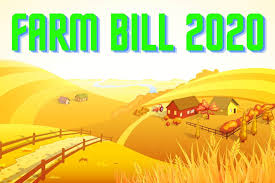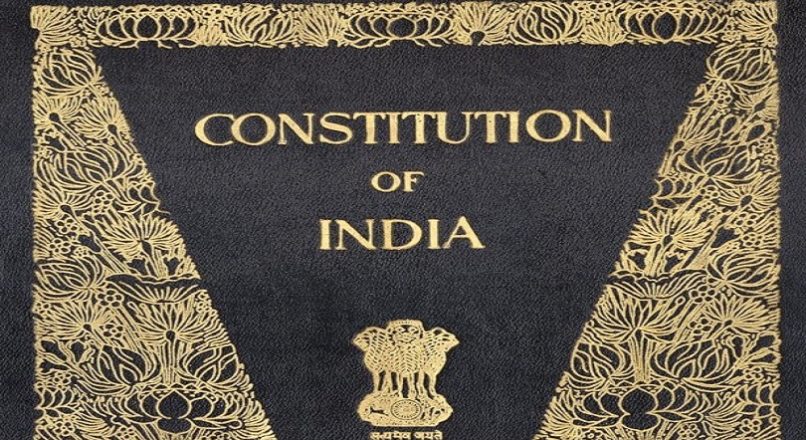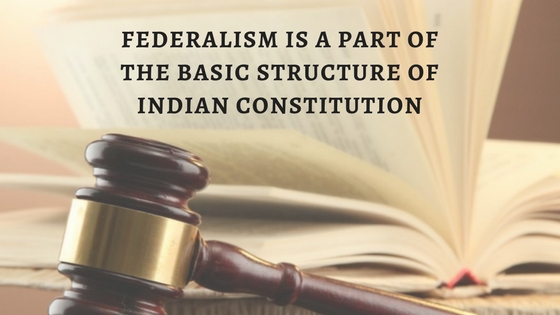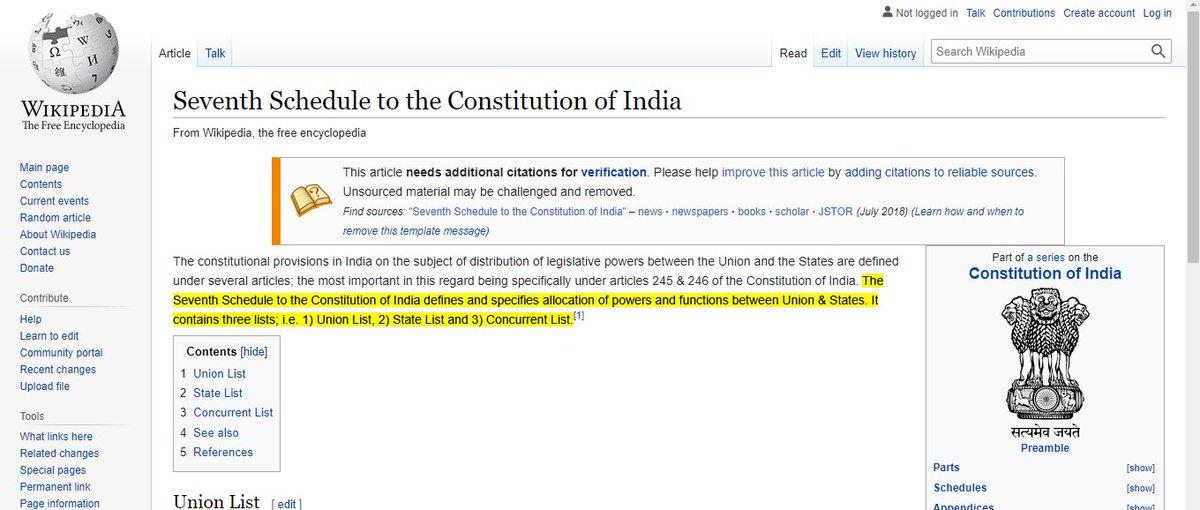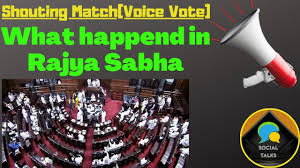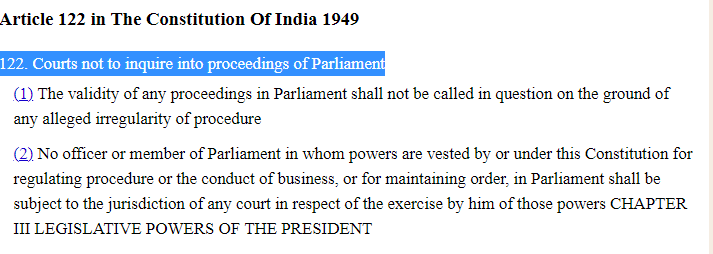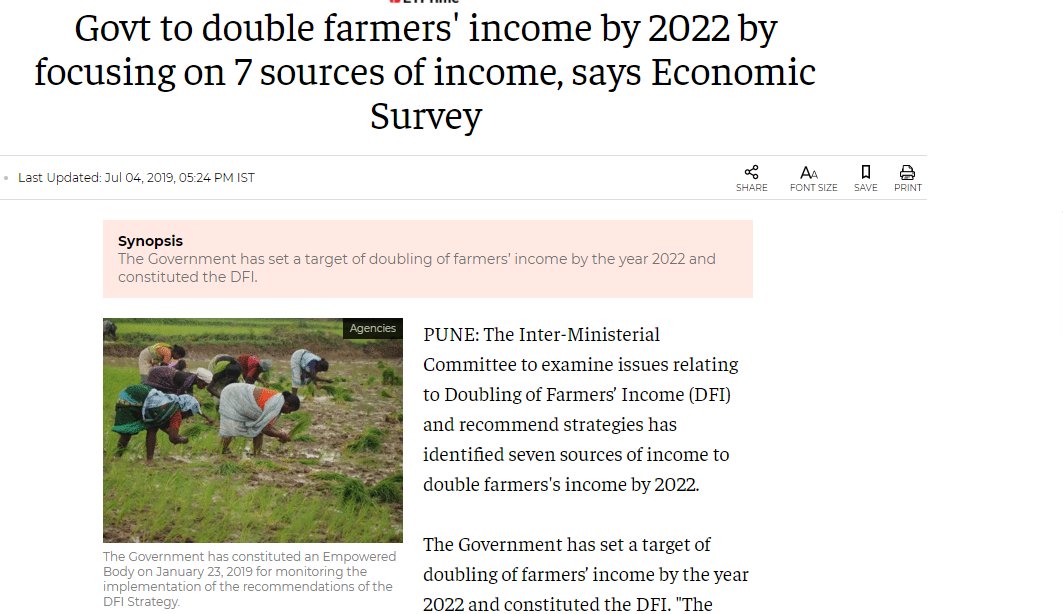#Thread on farm Act and all its controversies.
Let us start with the controversies-
Is this act unconstitutional as it is being preached by many political parties?
There are two ways in which a law can be declared unconstitutional: substantive and procedural.
Let us start with the controversies-
Is this act unconstitutional as it is being preached by many political parties?
There are two ways in which a law can be declared unconstitutional: substantive and procedural.
a. Substantive grounds are where the law itself is unconstitutional, which means the law is against the fundamental rights. Farm act is not about the fundamental rights.
b. Procedural grounds are where the way in which a law is enforced is unconstitutional.
b. Procedural grounds are where the way in which a law is enforced is unconstitutional.
Now, this give us two points where this law can be challenged-
I. If this act against the Federalism structure of India.
Federalism in India refers to relations between the Centre and the States of the Union of India.
I. If this act against the Federalism structure of India.
Federalism in India refers to relations between the Centre and the States of the Union of India.
In simple words, there are few sections where only state govt. can make law (state list) & there are few sections where only Centre can make law (union list). However, there are few section where both can make law (concurrent list), refers to the 7th schedule of our constitution.
Before 1954, only state govt. had powers to make law related to agriculture. But, in 1954, Nehru chacha did an amendment which gave powers to centre too to make agriculture related law, refers to the entry on 33 of concurrent list.
Also, in case of a conflict b/w state and centre govt. regarding any law made under concurrent list, the law made by Parliament dominates, (Article 254/1).
I can bet that supreme court will not even waste a second to deny the challenge based on this point.
I can bet that supreme court will not even waste a second to deny the challenge based on this point.
ii. If it is against the draft procedure of the Act.
Before discussing this, lets know something about ordinance. Legally, an ordinance is the equivalent of an Act; but is not passed by the legislature initially. It is a temporary law till its expiry or till it is repealed or
Before discussing this, lets know something about ordinance. Legally, an ordinance is the equivalent of an Act; but is not passed by the legislature initially. It is a temporary law till its expiry or till it is repealed or
till it is approved by the legislature (after which it becomes an Act). Article 123 provides power to centre to make ordinance. An ordinance will expire after 6 weeks once both houses of the Parliament are in session.
It is compulsory for a session of Parliament to be held within six months (as per Article 85). Therefore, the maximum validity of an ordinance is 6 months and 6 weeks.
Farm ordinance was introduced on 5th june 2020 and first session of parliament was held b/w 14-sept to 1st oct.
Farm ordinance was introduced on 5th june 2020 and first session of parliament was held b/w 14-sept to 1st oct.
hence it was necessary for the govt. to pass it. In loksabha this ordinance was passed easily and on 20th sept. this ordinance was presented in rajyasabha and was passed on the basis of voice vote, which was the biggest controversy.
Why voice vote?
For individual voting, all member requires to sit at their allotted seats which was not possible due to covid 19 situation and social distancing was mandatory.
Can the process of passing bill, decided by the speaker be challenged in any court?
For individual voting, all member requires to sit at their allotted seats which was not possible due to covid 19 situation and social distancing was mandatory.
Can the process of passing bill, decided by the speaker be challenged in any court?
No, referring to the article 122 which states that, Courts will not inquire into proceedings of Parliament.
Hence, one can question on the morality of the procedure but, there is nothing wrong with this act legally.
Hence, one can question on the morality of the procedure but, there is nothing wrong with this act legally.
Okay, let’s just suppose that the bill had got rejected in the rajyasabha, then this bill would have gone to the joint session and needed to be pass from there.
Loksabha has 543 members and rajyasabha has rajyasabha 242 members. Total members are 785.
Loksabha has 543 members and rajyasabha has rajyasabha 242 members. Total members are 785.
So, to pass the bill in the joint session one require to have 393 votes. NDA has 353 members in loksabha only. Hence nothing could have stopped farm bill to become an act.
However, congress is now talking to use Article 254/2 to override the act, which states-
However, congress is now talking to use Article 254/2 to override the act, which states-
Though states could come out with their own Bills to some extent to override the statutes of passed by the Parliament, none of those Bills would be effective unless the President accords his consent to such Bills.
But why there was a need of ordinance and so much hurry?
Modi govt. had promised to double the wedges of farmers till 2022 and for that major reforms are required.
If we see the acts, they are actually a very major reforms in the agriculture sector.
Modi govt. had promised to double the wedges of farmers till 2022 and for that major reforms are required.
If we see the acts, they are actually a very major reforms in the agriculture sector.
Govt. knew that any such reform will create major instability in opposition anyways.
What is the guarantee of the success of farm Act?
Well, Bihar did such reforms in 2006 and according to an article of "the print" itself-
What is the guarantee of the success of farm Act?
Well, Bihar did such reforms in 2006 and according to an article of "the print" itself-
"In the last five years, India’s agricultural growth has been 2 per cent while that of Bihar has been 7 per cent. Bihar is an example that agriculture does well when reforms are carried out," said by @ShekharGupta
link of full article- https://theprint.in/opinion/how-bihar-recorded-growth-but-punjab-lagged-behind-and-why-farm-reforms-are-important/562619/
link of full article- https://theprint.in/opinion/how-bihar-recorded-growth-but-punjab-lagged-behind-and-why-farm-reforms-are-important/562619/

 Read on Twitter
Read on Twitter